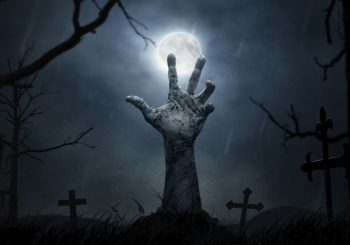By Nikki Harper
Staff Writer for Wake Up World
It’s nearly Halloween – the perfect time of year for ghost stories, ghouls, monsters and things which go bump in the night. It’s not just for kids, either; there are plenty of adults who enjoy some serious spine-tingling and who chill out by seeking out the chill factor.
This year, an estimated 69% of Americans will participate in Halloween in one way or another – and Halloween spending for 2022 is expected to hit an eye-watering $10.6 billion [1]. Indeed, year round, scaring people is big business. The scare and haunt industry, incorporating scare attractions and the like, brings in some $7.5 billion annually in the US [2]. Haunted house ticket sales are rising fast and people are spending more than ever before on these scary venues [3]. Paranormal tourism is also on the rise [4], and anecdotal evidence suggests a big increase in the number of people involved in paranormal groups and investigations. Not only are we happy to be scared, we’re happy to spend a lot of money being scared. But why?
Why Do We Seek Out Frightening Experiences?
This is a question which has intrigued philosophers through the ages. The paradox of painful art, sometimes also called the paradox of tragedy, questions why rational humans seek out painful (in this case scary) experiences via books, movies, attractions or other forms of art, when in real life we would all naturally do everything possible to avoid situations which scare us [5].
There are a couple of good theories as to what’s going on here.
Being Frightened is an Evolutionary Benefit
Some argue that human evolution has selected for and kept intact our ability to be frightened. We evolved to be frightened of noises rustling in the bushes at night, because once upon a time it probably really did mean you were next up on the menu. Those who were scared and ran away were more likely to survive to pass their genes, and their sense of fright, onto the next generation [6]. This helps to explain why we may be fearful of things which are not really dangerous (such as the giant but harmless spider I shrieked at last night); it also explains why we may feel real fear in the moment even though we know something on TV is not real.
Being Frightened is an Emotional Release
Another theory is that, since (if we’re lucky) the world just isn’t all that frightening any more on a day to day basis, our pent-up fight-or-flight fear emotions have nowhere to go. Therefore, we deliberately seek out experiences which scare us, so that we can have that adrenaline rush and let it all out. There are certainly physical changes in our bodies when we feel fear, so this makes sense.
Physical and Mental Health Benefits of Being Scared
When you get frightened, your adrenal glands release adrenaline, putting your whole body onto high alert. Norepinephrine is also released, and this is the hormone which helps you to focus and to think clearly in a state of crisis. Being frightened, therefore, actually increases your mental clarity. [7]
Cortisol is also released by the body as part of its stress response. While too much cortisol can lead to problems of its own [Wuw article], studies have shown that it plays a role in learning and memory and can help to combat the fear induced by some phobias [8]. Being scared therefore could actually help you to cope better the next time you are scared. Perhaps you watch all those scary movies because subconsciously you’re practising – a dress rehearsal for how to think clearly and cope better should the unthinkable happen in real life.
The arousal that comes with fear can also mimic sexual arousal, with studies showing that people who have recently faced fear exhibit higher levels of sexual attraction [9]. So maybe taking your new date to a haunt attraction isn’t such a bad idea after all?
Being scared can also help you to bond better with those around you. Oxytocin is released by the body during fearful episodes. This hormone, sometimes called the cuddle hormone, induces feelings of love, affection and bonding. In moments of genuine fear and danger, strangers will quickly bond together and work as a group in order to survive, aided in part by oxytocin – studies have shown that this hormone helps to settle the anxieties and panic induced by fear [10]. Your need to clutch your partner while you snuggle on the sofa during a horror movie is also an example of this. Simply put, we know we’re safer when we’re not alone, and being scared helps us to practice bonding with others.
Control is the Key
Of course, nobody genuinely wants to be put into a real-life frightening situation. But horror movies, scary novels and haunt or Halloween attractions and activities are good, safe substitutes, which enable us to experience the benefits of fear with none of the drawbacks – and no danger of actually being cut to ribbons by that chainsaw.
Being in control is key to being able to get scared safely. You can always turn off a movie or leave the theater or put down a book or leave the attraction. You’re in control as to how scared you want to be, and you get to call time when it stops being fun and starts being uncomfortable. That line in the sand is different for each of us, but we all know when we’ve reached it.
It’s important of course that you never allow someone else to push you over that line.
Within your own limits, however, being scared is overall a good thing. So, this Halloween, turn out the lights, light a candle and let the scares commence. Your brain and body will thank you for it eventually!
Article sources:
- [1] https://edition.cnn.com/2013/06/13/us/halloween-fast-facts/index.html
- [2] https://www.marketplace.org/2016/04/28/celebrate-half-ween-75-billion-scare-industry/
- [3] Haunted houses producing magic sales figures – TheTicketingBusiness News
- [4] Tapping Popular Ghost Tours for Historic Buildings Preservation – Bloomberg
- [5] https://www.iep.utm.edu/art-emot/#H4
- [6] https://science.howstuffworks.com/life/inside-the-mind/emotions/fear3.htm
- [7] https://www.inc.com/peter-economy/why-being-horrified-is-healthy-3-benefits-of-being.html
- [8] https://www.webmd.com/anxiety-panic/news/20110328/cortisol-may-help-reduce-some-phobias
- [9] https://www.researchgate.net/publication/18709788_Some_Evidence_for_Heightened_Sexual_Attraction_under_Conditions_of_High_Anxiety
- [10] https://www.uni-bonn.de/Press-releases/oxytocin-helps-to-better-overcome-fear
Recommended articles by Nikki Harper:
- Harnessing the Power of Synchronicity
- Beyond 11:11 – The Significance of Repeating Number Patterns
- A Time to be Born and a Time to Die: Can Astrology Predict Death?
- Premature and Caesarean Birth: An Astrological Misinheritance?
- The Benefits of a Daily Divination Practice – and How to Start One
- 7 Ways to Find Awe in Your Everyday Life
- Need Answers? Looking for Insight? 7 Ways Astrology Can Help
- Alone But Not Lonely: 6 Amazing Benefits of Solitude
- Dancing in the Rain: 6 Reasons We Should All Be Pluviophiles
- Finding Time for a Daily Spiritual Practice – How and Why to Devote Your Time
- 7 Simple Steps to Start Communicating With Nature
- Getting Started with Remote Viewing: Step by Step to Strengthen Your Psi Abilities
About the author:
 Nikki Harper is a spiritualist writer, astrologer, and editor for Wake Up World. She writes about divination, astrology, mediumship and spirituality at Questionology: Astrology and Divination For the Modern World where you can also find out more about her work as a freelance astrologer and her mind-body-spirit writing and editing services. Nikki also runs a spiritualist centre in North Lincs, UK, hosting weekly mediumship demonstrations and a wide range of spiritual development courses and workshops.
Nikki Harper is a spiritualist writer, astrologer, and editor for Wake Up World. She writes about divination, astrology, mediumship and spirituality at Questionology: Astrology and Divination For the Modern World where you can also find out more about her work as a freelance astrologer and her mind-body-spirit writing and editing services. Nikki also runs a spiritualist centre in North Lincs, UK, hosting weekly mediumship demonstrations and a wide range of spiritual development courses and workshops.
Say hi at Questionology.co.uk or on Facebook.







